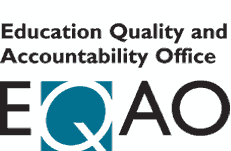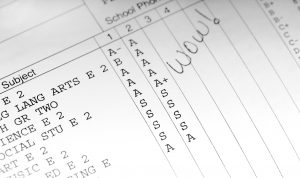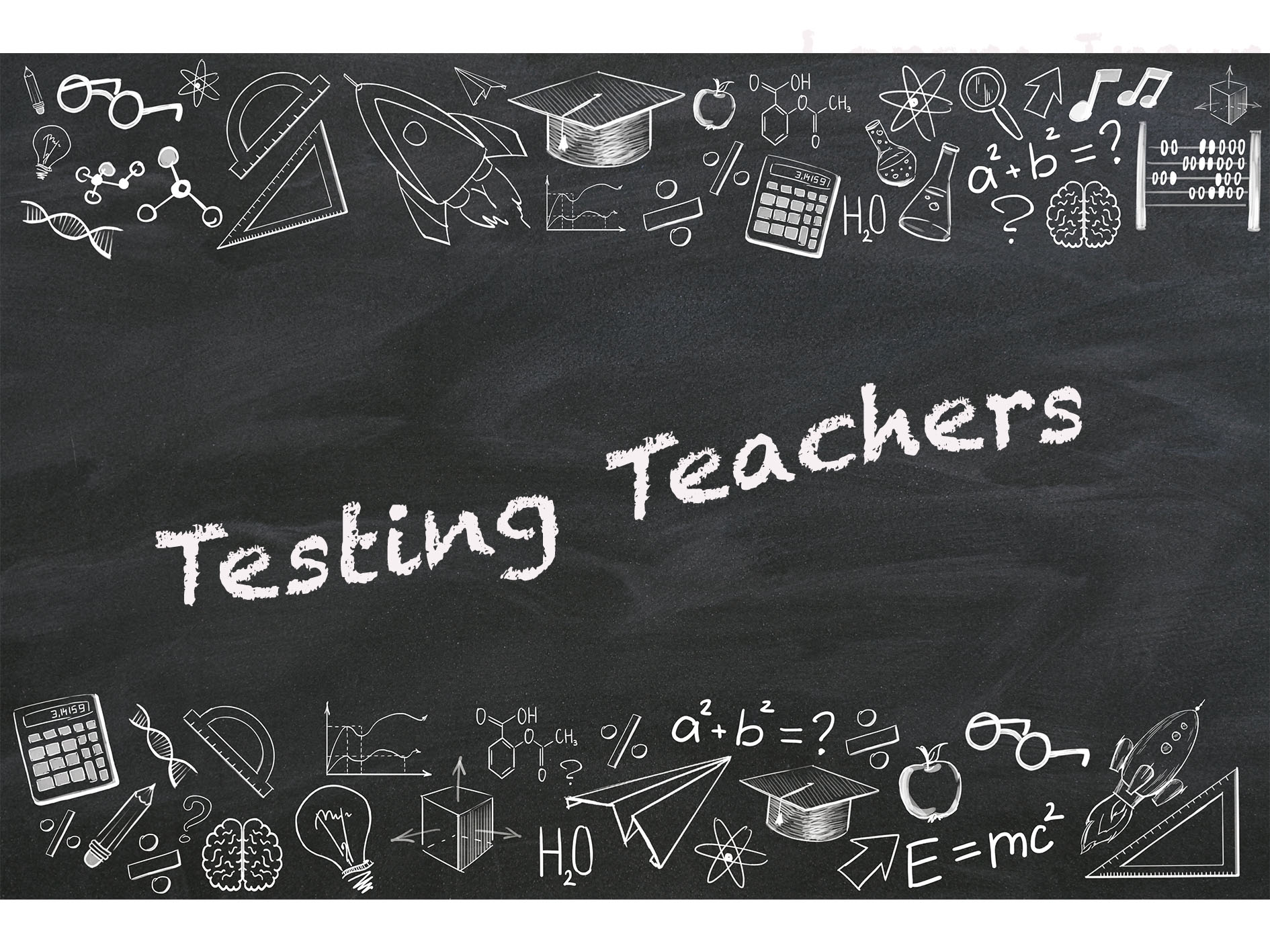The math proficiency test: a solution looking for a problem
Teacher candidates are taking the Ford government to court over math. As teacher candidate Bella Lewkowicz told School, aspiring teachers have been left with little choice. You can’t become a teacher without passing Doug Ford’s Math Proficiency Test (MPT); you can’t prepare for it because there’s so little information available and it’s been sprung on aspiring teachers mid-way through their teacher education programs.
The Ontario Teacher Candidate Council (OTCC) that represents these educators has tried to get information from the government as well as the Ontario College of Teachers (OCT), but without much luck. The response has been essentially, ‘suck it up.’ Teacher candidates who have invested time and money into their education, must now jump through an additional hoop to get their teaching certificates and they can’t apply for jobs without them.
What’s more, they don’t know when they’ll be writing the test. “We don’t get accredited through OCT unless we have a passing grade on this Math Proficiency Test,” explained Johan Kromhout, of OTCC, “that being said, there are no dates for the first writing of the test.”
Other than writing a field test, there’s no realistic way that teacher candidates can prepare for the MPT. OTCC president Brittney Vandersel tried it and commented that it is “…so underdeveloped and so poorly put together that there are questions that don’t have correct answers. There are questions you have to read 8 times and as a native English speaker I still had to decode the language….anyone who is not…is going to have issues in just the questions.”
Find out what’s broken before you fix it
It’s another example of a government looking for problems which they try to solve using the wrong tools. Since he was elected, Doug Ford said over and over, teaching of mathematics is broken in the province. He

said he would “scrap discovery math and inquiry-based learning in our classrooms and restore proven methods of teaching.” This is pretty much like taking a shovel to fix your computer; as School pointed out last year methods of teaching math are way more complicated than Mr. Ford appears to think.
At the end of August, soon after he was appointed, Education Minister Stephen Lecce referred to a “progressive, systemic decline of results since the implementation of Discovery Math,” and announced a $200 million dollar – over 4 years – strategy to fix it. This included $55 million in funding for school boards to hire “math leads” to guide them in their efforts to improve scores, just months after the Ministry cut school boards’ budgets, taking existing money from those very positions. It was also going to add $6 million for summer school – something boards were doing already and another $4 million for additional teacher qualifications courses in the subject. It’s worth noting too, that Mr. Lecce announced more funds to expand online tutoring in mathematics.
What’s most curious here is that the Ministry announced it would ensure new teachers “…entering the profession have the skills to teach math, and involve math in their teaching where appropriate.”
The Math Proficiency Test
This is where the Math Proficiency Test (MPT) comes in. It’s been prepared by the Education Quality and Accountability Office of Ontario (EQAO) which is also responsible for the test that Minister Lecce refers to  when he says less than half of Ontario grade 6 students meet the provincial math standard. EQAO sets the standards, then tests students to see if they meet the standard, then tests new teachers to see if they know enough about math to teach it to kids. According to EQAO spokesperson, Sophie Auclair, $258,559 has gone into its development so far but there are no numbers yet for final costs.
when he says less than half of Ontario grade 6 students meet the provincial math standard. EQAO sets the standards, then tests students to see if they meet the standard, then tests new teachers to see if they know enough about math to teach it to kids. According to EQAO spokesperson, Sophie Auclair, $258,559 has gone into its development so far but there are no numbers yet for final costs.
These costs include administering the test. According to a tender the government posted in January, the successful applicant would administer the test 3 times a year in French and English and provide the results to EQAO. School tried to get more information about the work involved and possible costs from the government purchasing agency; but didn’t receive any replies to emails.
Blueprint for the Math Proficiency Test
There is not much information available about the test for the general public, but EQAO does have a Blueprint.
It says that teachers need to understand the “big ideas” in math based on “core understandings” that “form a framework for learning mathematics in a coherent way” or, to put it more succinctly, the test is about teachers’ understanding of numbers, proportions and measurement. It’s also meant to assess teacher candidates on their knowledge of teaching methods or pedagogy.
Here is a sample of what the test is supposed to assess:
Number Sense (including)
- Operating with whole numbers, integers, decimals, and fractions: addition, subtraction, multiplication, division, and square root
- Expressing whole numbers using place value and expanded form
Relationships and Proportional Reasoning (including)
- Ordering and comparing whole numbers, integers, decimals and fractions
- Using relationships among fractions, decimals, and percent
- Working with percent
Measurement (including)
- Applying Pythagorean theorem
- Solving problems involving conversions of metric units (perimeter, area, and volume).
- Solving problems involving perimeter of regular and irregular shapes and circles
Sample questions include:
Drag the appropriate value into the indicated location on the number line ( that includes 0……1/2…….1)
Place the following measurements in order from least to greatest: 1m 90cm, 2m, 85cm
There is also a questionnaire that teacher candidates fill out about their attitudes towards math, The Mathematics Attitudes and Perceptions Survey (MAPS) developed at University of British Columbia
Sample questions include:
“This is a survey of your attitudes and perceptions about math; these statements all have the response choices Strongly Agree, Agree, Neutral, Disagree and Strongly Disagree, and should take less than 10 minutes. Please choose the response that matches your opinion, not what you think an instructor might say or want to hear
After I study a topic in math and feel that I understand it, I have difficulty solving problems on the same topic.
I’m satisfied if I can do the exercises for a math topic, even if I don’t understand how everything works.
I do not expect formulas to help my understanding of mathematical ideas, they are just for doing calculations
Math ability is something about a person that cannot be changed very much
If I am stuck on a math problem for more than ten minutes, I give up or get help from someone else
In math, it is important for me to make sense out of formulas and procedures before I use them.
I often have difficulty organizing my thoughts during a math test.
This is stunning. After writing a very high stakes test, the people making you write it want you to candidly comment on your perceptions about your abilities and attitudes, bearing in mind that your results on the test determine whether or not you get a teacher’s certificate. It makes no sense and has nothing to do with the apparent purpose of the MPT: assessing math and pedagogical skills.

Some questions worth asking
What about the claim that less than half of Ontario grade 6 students met the EQAO guidelines for success in mathematics?
Yes, it’s true. since 2016, grade 6 students have been hovering around the 50 percent mark in meeting those guidelines. For the last two years that number has dropped to 49 and 48 percent.
But there’s more to the question. First, there has been concern for some time over the EQAO Grade 6 Math assessment. The Peel District School Board (PDSB) asked the province to suspend the assessment for 2017-18, according to a CBC report, because of the “strong discrepancy” between marks reported for students on the board’s grade 6 report cards and the same students’ results on the EQAO math test. PDSB chair of the time Janet McDougald told Metro Morning that “We’ve been targeting Math for three years, very specifically, for three years but we’re still not making any progress with regard to that particular test.” When the question was put to him this past August by iPolitics, Minister Lecce didn’t know if students were below standard on their report cards at the same rate as on their EQAO results.

That discrepancy between report cards and EQAO results raises another important question: How does the work students do day-to-day in math relate to how they perform on a one-off assessment? There’s also no information about the differences between schools that spend a lot of time prepping kids on how to write the test as opposed to others that spend more time on subjects like literacy, science and social studies.
There have long been questions about the way the test is presented. The language can be dense and, of course students don’t get help interpreting what questions mean: Here is one from the 2019 test:
Which of the following tables of values shows a pattern that follows the rule “Start at 3, and then double the term and add 2 to get the next term”?
Correct answer: 3 8 18 38
Students without English as their first language or who have any difficulty reading are going to face problems with these sorts of questions. Is the assessment testing language or math?
Another factor that might explain why report card results are different from EQAO results is that EQAO draws its questions from a very large number of expectations – once a year, unlike report cards that come out every term. There are 62 specific expectations in the Ontario curriculum for Grade 6 math – covering Number Sense and Numeration; Measurement; Geometry and Spatial Sense; Patterning and Algebra and Data Management and Probability.
To sum this up, it’s really worth asking why students in grade 6 aren’t doing as well as they might on EQAO Math, but the answer is more complicated than “it’s the fault of Discovery Math” or “teachers need to be tested.”
Are teachers bad at mathematics?
That’s an important and basic question. With all the fanfare accompanying the MPT, there must be a pretty serious problem in search of a solution. But does the Ford government have any information to back up its assumption that teachers might not be at least competent in math? That answer, so far, is “no, it doesn’t.” School repeatedly emailed and called the Ministry of Education’s media office about this question and received no reply. There isn’t one study reported by EQAO that supports the notion that Ontario’s teachers can’t do math or ought to be tested on the subject.
Do all teachers need to be able to apply the Pythagorean Theorem?
Only if they all live on right-angled triangular properties and need to figure out the length of the long side (a2 +b2=c2). Otherwise needed math skills vary. Teachers working with kids from kindergarten to grade 3 certainly don’t require the higher-level skills the MPT might assess.
 Elementary teachers of grades 4 to 8 wanting to focus on mathematics as their teaching subject have to take four courses in the area. And as teacher candidate Johan Kromhout pointed out, he didn’t need to write a math proficiency test to be accepted into a Bachelor of Education program for primary and junior grades. The curriculum and related guides alone provide plenty of background about the concepts he’ll need to teach kids. Until the Ford government slashed school board budgets forcing cuts to consultants and lead teachers, there were also experienced staff available to help new teachers.
Elementary teachers of grades 4 to 8 wanting to focus on mathematics as their teaching subject have to take four courses in the area. And as teacher candidate Johan Kromhout pointed out, he didn’t need to write a math proficiency test to be accepted into a Bachelor of Education program for primary and junior grades. The curriculum and related guides alone provide plenty of background about the concepts he’ll need to teach kids. Until the Ford government slashed school board budgets forcing cuts to consultants and lead teachers, there were also experienced staff available to help new teachers.
Teachers planning to teach math in high school have to list it as one of two teachable subjects. To do that they need to take 6 university level courses on the subject. People, like teacher candidate Bella Lewkowicz plans to teach French in high school. Passing a math test is irrelevant – a waste of time and effort.
Is there a connection between compulsory testing and students’ success in mathematics?
EQAO has a booklet full of information about compulsory testing of teachers and student results. EQAO admits the connection is unclear. Yes, there is a strong and unsurprising relationship between teachers knowing how to teach math and their students’ success, but: “The body of evidence examining the connection among standardized teacher competency testing on both pure content knowledge and pedagogical content knowledge and student outcomes is mixed.”
What’s more, EQAO noted in this booklet that “evidence suggests that some of the standardized teacher competency tests may be dissuading individuals with potential, rather than objectively unqualified teachers, from entering the pipeline.” It goes on to say: “Empirical evidence shows that state regulators may not be in the best position to assess quality teaching.”
This is quite a remarkable statement coming from that very state regulator setting the test. EQAO appears to be arguing against itself, admitting that what it has set out to do has little if any purpose. If there’s no compelling reason to spend untold millions of dollars on testing whether or not teachers know basic math, why do it?
Teacher candidates want fair treatment
The three teacher candidates I spoke with agreed that teachers need to know about their subjects. They even suggested that there could be a mandatory math course they would take; something that would provide feedback to help them become better teachers. But they want to be treated properly. The Ontario Teacher Candidates Council’s (OTCC) court action challenges “the fairness, the reasonableness and the lawfulness of the Math Proficiency Test…” on the basis that teacher candidates weren’t consulted about the regulation that affects them or about the validity of the test itself. It also says that the test was made part of teacher accreditation requirements well after they had begun their training program; it’s moving the goal posts in the middle of the game.
In light of all the concerns related to COVID-19, the OTCC asked the government to cancel the Math Proficiency Test and allow the College of Teachers to give teacher candidates the accreditation they need to apply for work in education.
What the Ford government should do
Instead of fighting the court action of OTCC, the Ministry of Education should take time to examine its position. It still can’t be sure that grade 6 kids aren’t managing adequately in the subject. If it’s true they are having problems, the Ministry doesn’t know what those problems are. It doesn’t know if poor instruction or teachers’ math skills contribute to them. It is certainly not clear that the test it plans to use with teacher candidates will assess the skills it seeks.
This is a political test. It’s based on the fact that a premier with no teaching qualifications decides he knows that kids aren’t learning math because they need to go back to basics. Therefore, in a great leap of logic, teachers must be tested. The underlying premise of all of this spending, finger-pointing and testing is: “Doug Ford said so.”


